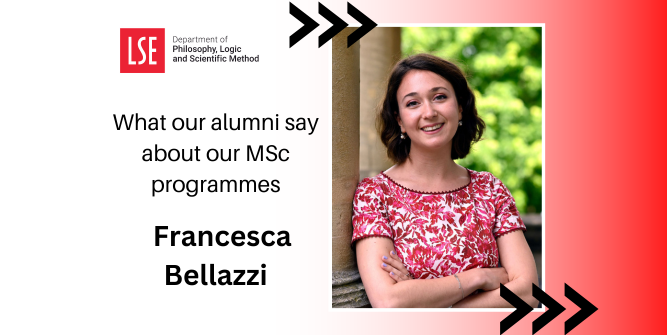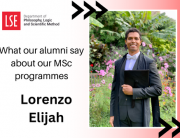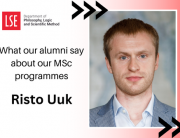1. Why did you choose LSE and the programme?
My main interest was really the Philosophy of Science and the LSE program seemed one of the best ones to deepen my knowledge in the discipline. In particular, the combination of general modules, such as Philosophy of Science and Rationality and Choice, with more specialised ones, such as Einstein for Everyone or Genes, Brains and Society, represented a further reason to choose the MSc program in Philosophy of Science. And, in all honesty, I have a strong passion for the history of philosophy and I was excited at the idea of studying at the department of Karl Popper and Imre Lakatos, and now affiliated with amazing philosophers such as Nancy Cartwright.
2. Which aspects of your studies were the most beneficial for your professional as well as personal development?
The MSc program really pushed me to improve my philosophical writing, in terms of content and in terms of style. The quality expected was high and we were encouraged to combine rigorous philosophical reasoning with precisely applied case studies. Moreover, we were guided in writing in a concise and efficacious way. This really allowed me to start my PhD the year after with the appropriate tools to write high-quality research papers and engage in the literature appropriately. I still apply the method I learned in my current professional philosophical reasoning. Moreover, the interplay of theory (philosophy) and reality (the case studies) represents for me a more general and overarching way to approach life and everyday problems, which is an important part of my personal development.
3. What is your fondest memory of your time here?
My fondest memory is definitely the philosophical department retreat at Cumberland Lodge. I love the English countryside, philosophy and spending convivial time with friends and colleagues and having the chance to do all of that in one weekend has been wonderful. I remember how we attended interesting seminars held by our professors, followed by discussions at dinner and walks in nature. A once in a life experience!
4. Why would you recommend studying at LSE and the Philosophy department in particular?
My take on this would be very philosophical, but one of the things that I found more unique about the LSE Philosophy Department – together with the high quality of its modules – is that it is a department that has a strong philosophical identity in terms of “school of thought” and it is in line with its history. It is one of these departments where the interplay of philosophy and sciences is strong and has For instance, I remember how we considered in detail Epistemic Structural Realism and we had the chance to discuss the view with John Worral, allowing us to engage directly with thinkers that had a strong impact on how we think about philosophy of science today.
5. Your LSE experience in your own words
It has been one of the most formative periods of my life, challenging and enriching, and it has played a fundamental role in my philosophical development, allowing me to further ground my passion for philosophy and leading me to do it now professionally.
Dr Francesca Bellazzi is currently a Teaching fellow at the University of Birmingham (Last update: September 2023).














Connect with us
Facebook
Twitter
Youtube
Flickr